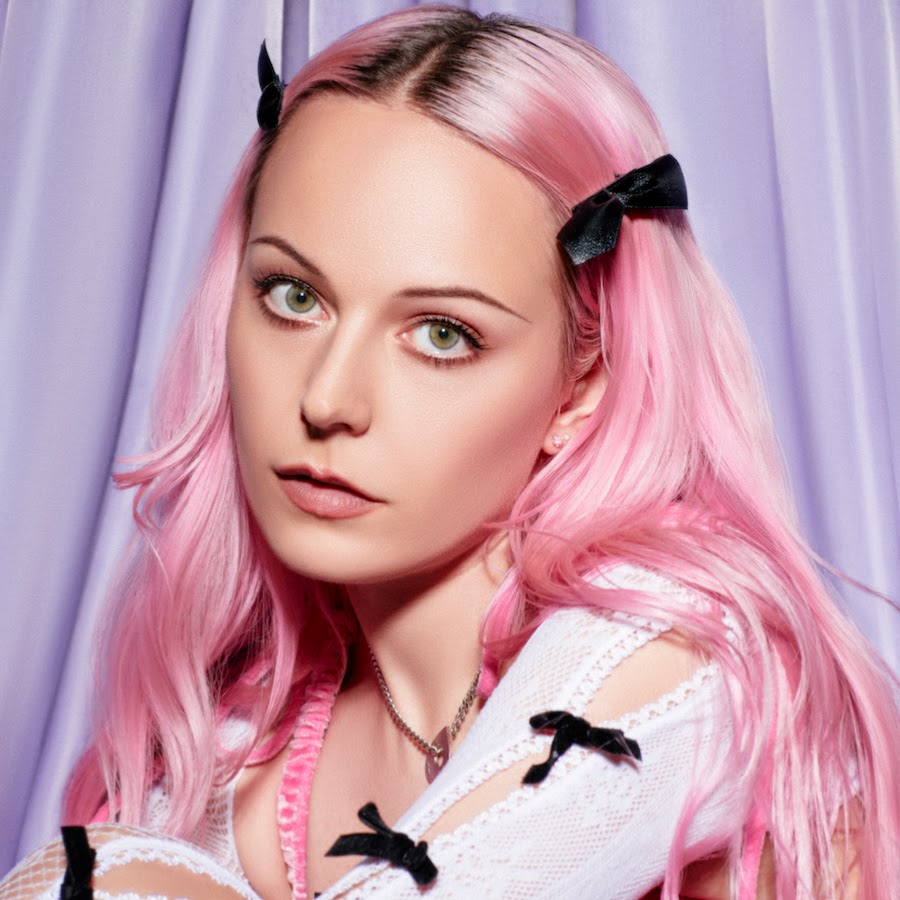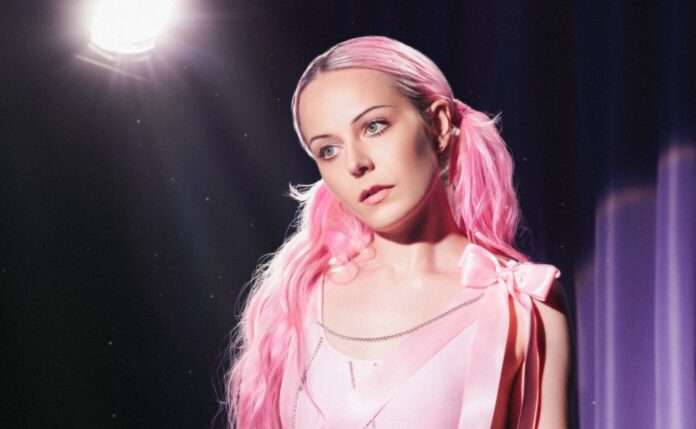“Poster girl on my wall/ I wanna be just like you,” musician and photographer Hannah Diamond sings on “Poster Girl,” a highlight from her new album Perfect Picture. “A girl too good be true.” It’s a record obsessed with the contrast between glossy images and messy, imperfect reality, which is reflected in its maximalist, full-bodied electropop arrangements; its swingy rhythms and bright digital synths often sound like synthetic ‘80s pop run through a smoothing algorithm to wipe out any blemishes.
Over this production—provided by David Gamson, best known for his work with Scritti Politti— Diamond’s explorations of performance and projection counteract the hyperreal sheen, giving the sense of a real person trying to find their way in a world of superficial beauty.
Diamond originally gained prominence as a part of the PC Music collective, a group of artists whose work used the structures and imagery of pop music to communicate the challenge of finding authenticity in a digital world. But just a few months before the release of Perfect Picture, the label – run by PC Music figurehead AG Cook – announced that it would cease releasing new music at the end of 2023. This leaves Diamond in an interesting place. To my ears, this album is her best work yet, and she’s currently on her first US headline tour, but the future is full of questions.
On the eve of her headline show at the Rickshaw Stop Fri/20, I spoke with Diamond about Perfect Picture, the ways that photography and pop music can inform each other, and Kesha deep cuts.
48 HILLS Thanks so much for speaking with me, and congratulations on the album and tour. It looks like this is the first time you’re playing San Francisco?
HANNAH DIAMOND It is, yeah.
48 HILLS Have you been to the city before?
HANNAH DIAMOND No, I haven’t! So I’m super excited to come.
48 HILLS That’s really cool! Well, we’re really excited to have you. This is your first headline tour in the US. How does it feel to have reached this point in your career where you can do a headline tour here?
HANNAH DIAMOND It feels really cool. It feels like an immense privilege, actually. I feel really lucky that I have so many fans all over the world now, that makes this kind of thing viable.
48 HILLS I’m a big fan of your work. I was listening to the album these past couple days, and it felt to me like it was kind of a major turning point. It feels very different from your previous album Reflections in that it feels like it has a very focused, confident quality while still feeling very vulnerable. I was wondering if it feels that way to you, and where you think that might be coming from.
HANNAH DIAMOND It definitely does. I think that it’s really a reflection of where I’m at right now. When I put Reflections out, I felt pretty disempowered, and I don’t think I was… I don’t know, I wasn’t feeling myself, you know? I’d had a big breakup, and lots of stuff was going on that made me feel quite small. I think that album was me exploring that feeling and figuring out how to overcome it. And this album is the feeling of having overcome that, being in a much more empowered position in my personal life, my work, and so many different areas of my life.

48 HILLS That sounds like a more grounded place to be doing creative work from.
HANNAH DIAMOND One hundred percent. I think heartbreak can be really good for creative work. It can be really inspiring. And when I was starting to write this album, I was like, “I don’t have any extreme emotions right now. I wonder if I’ll have anything to write about?” But I actually found it kind of freeing to feel like all my music didn’t have to be about that. I could explore things I’ve been thinking about, things I’m interested in. It could become more conceptual. That’s been really exciting.
48 HILLS So if the first album was more about a specific event or a specific feeling, what would you say that this record is about?
HANNAH DIAMOND For me, this record is about my relationship with myself. It’s an exploration of all the different aspects of my personality and my identity, unpacking this space in between myself as the self that my closest friends and family know and the self that is kind of my newfound pop-star self—the space in between being a person and an image. It’s also a lot about my relationship to girlhood and girlishness and the way I express myself, and, I guess, figuring that out. Does that make sense?
48 HILLS Yeah, it does! It actually leads into one of my other questions. You were talking about the space between the real and the image, and I was interested in how this album incorporates photography as a theme; you’re also a photographer and that’s a big part of your work. I was wondering, are music and photography complimentary practices, and do they influence each other?
HANNAH DIAMOND Yeah, one hundred percent. I think that comes from that being such a huge part of my life and my identity. A lot of my everyday [life] is about making images for people, making images for myself. Essentially, a pop star project is kind of like a self-portrait in a way—I always see it as that. I think that what I do with my images, especially the ones that I make of myself, are just a different way to express the same thing that I do with my music. They’re super intertwined, and they kind of feed into each other and inspire each other.
48 HILLS I was looking at the credits for this record, and it seems like it’s a broader set of collaborators this time around—David Gamson, Guy Sigsworth, Jenn Decilveo, and then also Kesha and [DJ duo] Nervo. So I was interested in how all those collaborations came about.
HANNAH DIAMOND I think the first proper session that I did with Dave was with Jenn in LA, maybe four, five years ago? That was for “Staring At the Ceiling.” And that session went so well. I felt like me and Dave really gelled. I came away from that session feeling like, “Wow, I really love that song. That feels like that’s going to be something really solid.”
Then, when I was thinking about, “What am I gonna do for my next record, who’s going to produce it?” and all this stuff, I knew that one of my priorities was to get back into the studio with Dave. A lot of these collaborations came from needing to come back to LA to work with Dave. Obviously Cecile Believe is one of SOPHIE’s really good friends and collaborators, so I already knew Cecile and really wanted to work with her. And I met Nate Campany through Dave, because they’ve worked together quite a lot.
Through working with Dave, when we were writing the album, he told me about this track that he’d written with the Nervos and Kesha for her first album that didn’t make the cut. But he said he’d kept thinking about it in relation to my album because a lot of the themes were pretty similar. He dug out the file and I was like, “Wow, this is such an amazing song!” And Dave was like, “Yeah, Kesha didn’t feel like it was quite right for her. What would you think about us asking her and the Nervos if we could do something with it?” And I was like, “I would love that!”
Kesha’s first album was, and is, one of my favorite pop albums ever, and that album is how me and AG [Cook] came to know about Dave’s stuff. Because we were really obsessed with this song called “Stephen” [which is coproduced and cowritten by Gamson] on her first album.
48 HILLS I love that song!
HANNAH DIAMOND Me too! It’s one of my favorite songs ever. It felt like this really full-circle moment to have her demo from that album become a part of my album [as the song “Want You To Know”]. And I’m so grateful and happy that she trusted me to do my own thing with it and allowed me to give it a home. It just feels so special.
48 HILLS Up until now—this record included—you’ve been releasing music as a part of the PC Music label. And I know PC Music is broader than just the label, it’s also a scene and a musical universe. Your work was actually part of how I became aware of that whole scene in the first place. Now that the label has announced that it’s just going to focus on reissues and archival work instead of producing new music, I was wondering how you see the future of that whole scene?
HANNAH DIAMOND Well, I think what you said: PC Music is so much more than just a label. For me, I see it as these three different things. I see it as the label, which is more for distributing. And I see the community around PC Music, which is actually connected to all of the artists in this really deep, special way. And then there’s also the group of artists themselves. I think that the community is gonna shift with us and grow with us as we transition to this new space, which is really cool.
48 HILLS Did you know that the label was going to be making the shift while you were making the record, or did you find out later in the process?
HANNAH DIAMOND No, I didn’t know that the label was going to do this. It’s funny that the last line of my album is “Sometimes good things come from an ending,” because at the time when I wrote that, it was symbolic for my album ending. Now it feels like it has this deeper, extra meaning, which is cool. Maybe I’m psychic. [laughs]
48 HILLS I believe it! And then my last question is, how do you plan to translate this record into a live experience? How are you approaching that?
HANNAH DIAMOND So right now, this tour that I’m doing, I’m treating it like my greatest hits tour, which is really funny. But I’m doing that because I didn’t get to tour Reflections in the US because of COVID. So I’m kind of trying to do some of the old, some of the new, and all of the favorites. At the moment I feel like it’s a hybrid show, which is working really well. I’m really happy with my setlist. I feel like both albums are coming from really different places emotionally, [but] the setlist I’ve chosen really flows and really fits together in this special way, which is cool.
When I go back to London after this round of shows, I’ll be figuring out with my team how to build this world out in the live space. I don’t want to give too much away, because I’m planning some things that I’m really excited about, and I want to save it.
HANNAH DIAMOND Fri/20, 9pm-2am, Rickshaw Stop, SF. More info here.







